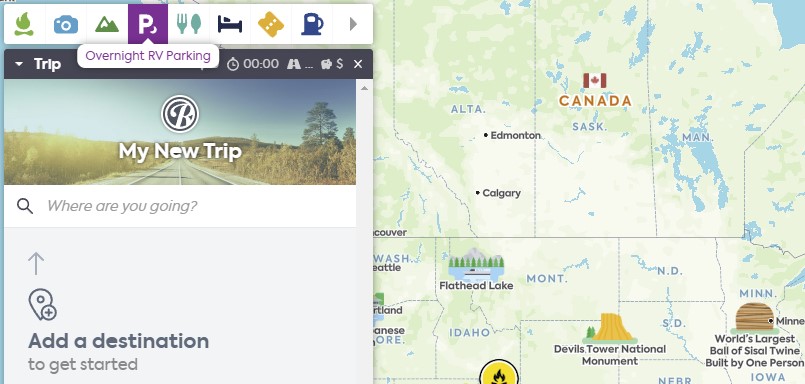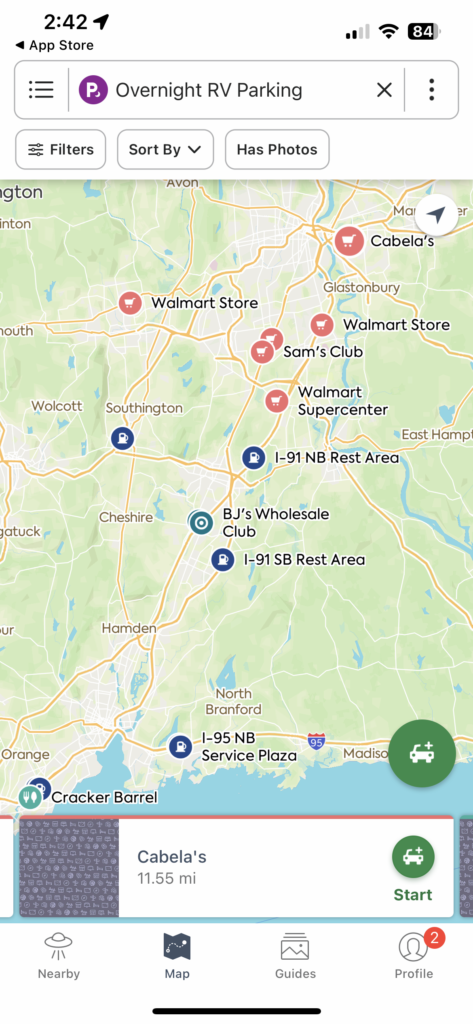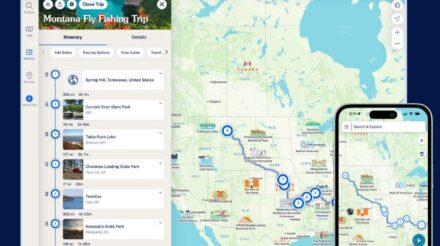When there are a lot of miles between you and your next destination, sometimes the safest option is to find somewhere to pull off the road and take a break from driving. This break could mean anything from a quick stretch and a snack to spending the night in your RV in a parking lot.
Key Takeaways
- Overnight parking is allowed in many states at rest areas, though rules differ by state.
- Camping is not allowed at any rest area, meaning no slides out, awnings, or outdoor gear.
- Rest areas help fight drowsy driving that causes about 100,000 crashes each year, mostly between midnight and 6 a.m.
If you’re looking for a comfortable and free place to recharge overnight, look no further than highway and interstate rest stops. Here is a comprehensive guide to overnighting at public rest areas in your RV.
Is Overnight RV Parking Allowed at Rest Stops?
Many states, though not all, allow travelers to park overnight at rest areas. No states, however, allow camping at rest areas. This means that you’re welcome to crawl into your camper for a good night’s sleep, but you’re not welcome to set up camp or linger.
Located along major U.S. routes and highways, rest areas are designed to give travelers a place to stop, use the bathroom, take a nap, stretch, and eat a snack or meal. Some rest areas are simply parking lots along the road, while others have amenities like bathrooms, visitor centers, dog runs, WiFi, dump stations, and restaurants.
Overnight RV Parking at Truck Stops
Rest areas aren’t just great for drivers, they’re also key to public safety. According to the National Safety Council, drowsy driving accounts for about 100,000 crashes each year, with most accidents happening between midnight and 6:00 a.m. Overnight parking at rest areas is one way that states can help keep drowsy drivers off the road.
Benefits and Amentities of Overnight RV Parking at Rest Stops
Overnight RV parking at a rest area is a great way to break up a long drive with minimal fuss. With rest areas located along major travel routes, you have the opportunity to take a break from the road without the hassle of driving to a campground, checking in, and setting up camp. You can simply roll into the lot, find a safe place to park, and enjoy the comforts of your RV.
Rest areas are often spacious enough to accommodate any size RV, including big rigs. Many are well maintained and offer amenities such as bathrooms, WiFi, and dog runs, while some even have luxuries like restaurants and fresh water to fill your tanks.
With few exceptions, rest areas that allow overnight parking are also free to use, open 24 hours a day, and well-marked along highways and interstates.
Like any free camping area, it’s best to read online reviews and scout the area before deciding to stay the night. Most rest areas are located along patrol routes, but they may only get checked once or twice a night.
How to Find Rest Stops that Allow Overnight RV Parking
Roadtrippers Premium makes it easy to locate a rest area and other locations that allows RVs to stay the night. Start by logging into the Roadtrippers website or open the app. On the website while on the map click on the Purple P icon to show places that offer overnight RV parking.

In the app while on the map, tap the Search & Explore bar and select Overnight RV Parking from the list of categories.

For more information regarding how to use Roadtrippers you can check out our support page for overnight RV parking.
State-by-State Rest Stops Rules For Overnight RV Parking
Regulations for how long you can stay at rest areas vary between states. Some states that allow overnight RV parking are highlighted below, but refer to local signage and individual states’ Department of Transportation websites for more in-depth information.
Arizona: Arizona rest stops allow travelers to park overnight. They don’t, however, allow camping or campfires. If sleeping overnight at an Arizona rest stop, keep your trailer hooked up, your slides in, and keep all of your gear inside.
Arkansas: You must sleep within the confines of your vehicle, and no camping is allowed. Some Arkansas rest areas and welcome centers offer RV dump stations, too.
California: Camping is prohibited at rest areas but you can park for up to 8 hours in any 24-hour period. RVers can use gas-fueled stoves and a few rest areas have a dump station; otherwise dumping is not permitted.
Delaware: You can park overnight at the state’s two rest areas: There is a 6-hour time limit at the rest area on Highway 1 and an 8-hour time limit at the Interstate 95 Welcome Center truck and RV parking lot. No camping is allowed.
Idaho: Idaho’s Department of Transportation allows for overnight stays that give travelers “rest and relaxation from the fatigue of travel.” It doesn’t allow camping. You can park in an interstate highway rest area for up to 10 hours and in state highway rest areas for up to 16 hours.
Kansas: You may park overnight in a Kansas rest area for one night; no camping allowed.
Massachusetts: There are no statewide restrictions for overnight parking at rest areas, but some have signs posted that prohibit overnight parking or have a 2-hour time limit. Note that you cannot leave your vehicle unattended for more than 30 minutes.
Mississippi: Vehicles can park for up to 8 hours. No “recreational camping” is allowed.
Missouri: Overnight parking is permitted at Missouri rest areas.
Montana: The state welcomes travelers at its rest areas to beat drowsiness and increase safety.
Nebraska: Vehicles can park for up to 10 hours at Nebraska’s rest areas along popular Interstate 80. The state doesn’t allow camping at rest stops.
Nevada: Nevada’s rest areas allow vehicles to park for up to 18 hours. Some also have dump stations.
Overnight RV Parking at Casinos
New Mexico: New Mexico allows travelers to park for 24 hours in any one of its rest stops. This is limited to one 24-hour stay in any 3-day period.
North Dakota: Overnight parking is welcomed at rest stops in North Dakota. Some offer free WiFi and water, too.
Ohio: Ohio’s eight service plazas on the Ohio Turnpike offer designated RV parking with electric hookups, available for a fee. Each site is first come, first served. Ohio doesn’t allow overnight parking at any of the other rest areas in the state.
Oklahoma: Overnight parking is allowed at rest areas in Oklahoma.
Oregon: No camping is allowed at rest areas in Oregon, but travelers can stay for up to 12 hours in the state’s highway safety rest areas.
Pennsylvania: Parking is allowed for 2 hours in a 24-hour period for rest areas managed by PennDOT; overnight parking is allowed for 24 hours at service plazas and areas managed by the state’s Turnpike commission.
Rhode Island: Rhode Island doesn’t allow camping in its rest areas, but it allows overnight parking for safety and rest.
Texas: The state allows parking for up to 24 hours at its rest stops. No camping is permitted.
Utah: Utah’s rest areas welcome travelers for “extended stays” but no overnight camping. On-site staff and the state’s highway patrol monitor travelers taking an extended break.
Washington: You can’t camp in Washington rest areas, but you can stay up to 8 hours, as well as grab a cup of coffee, which is provided free at many Washington rest stops.
West Virginia: West Virginia welcomes travelers and semitruck drivers to take an overnight driving break at one of the state’s travel plazas.
Wyoming: Overnight parking and camping aren’t allowed at Wyoming rest areas but longer naps are permitted, as needed.
States with short parking time limits include Illinois (maximum stay is 3 hours), Kentucky (maximum stay is 4 hours in a 24-hour period), Maryland (maximum stay is 3 hours), New York (maximum stay is 3 or 4 hours depending on the location), and Tennessee (maximum stay is 2 hours).
Rest Stop Overnight Parking Rules, Safety Tips, and Best Practices
Staying overnight in a rest area is not the same as camping at a campground. To make your stay enjoyable—and to avoid a middle-of-the-night knock from a grumpy neighbor or a police officer—follow these best practices.
Stay hitched and keep your slides in. Most states that allow overnight parking at rest areas explicitly prohibit “camping.” To make sure it doesn’t look like you’re setting up camp, stay hitched (if pulling a trailer) and keep your slides in. Also, don’t put out furniture, unfurl your awning, or pull out your BBQ.
Leave space for truckers. Semitruck drivers often use rest areas to wait out their federally-mandated breaks. If the rest stop has semitruck parking spaces, do your best to leave those for truck drivers. Instead, park on the lot’s perimeter or, if you can fit, in regular parking spaces.
Follow any posted rules. Rest stops are often part of a police or highway patrol route, so be sure to follow any posted rules. This includes honoring stay limits and other parking regulations.
Just because you can’t set up a full campsite in a rest area doesn’t mean that you can’t have a good night’s sleep. Here’s how to make the most out of a night spent at a rest stop.
Park smart. Look for the quietest place in the rest area and park there. This will likely be a spot furthest away from the road and a reasonable distance away from any semitrucks, who often run their engines through the night. If you feel comfortable with the rest area’s location, you might choose to park away from any streetlights or buildings. If you feel safer in the light, place reflective insulation in your windows to help block the beams.
Bring earplugs and a face mask. Rest stops can be noisy places, especially ones along busy highways. If safety is a concern, consider investing in earbuds that help reduce ambient noise—like a truck rumbling—but will still allow you to hear what’s going on around you. A face mask can help block out any light.
Take advantage of rest stop amenities. While many rest stops are simply parking lots along the highway, some states have invested in better infrastructure to accommodate RV travelers. This can include on-site dump stations, water and electric hookups, free WiFi, snack bars or restaurants, and dedicated RV parking.
Overnight RV Parking at Rest Stops: FAQs
Many states allow campers to legally stay overnight at a rest stop for a night. It’s important to note that staying overnight means parking and camping within your RV or vehicle—it doesn’t mean setting up a full campsite or staying for an extended period of time.
You can sleep in your RV at a rest stop in many states. See the list above for some specific U.S. states that allow overnight RV stays at rest stops.
Typically, rest stops allow you to sleep for 1 night. Where overnight RV parking is permitted at rest stops, it’s usually to accommodate a quick night’s sleep between destinations and make sure that you have a place to rest so that you aren’t driving while drowsy.
Most rest stops allow RVers to stay overnight to “relieve the fatigue of travel.” They’re not intended as camping destinations. If a rest area allows for overnight RV parking but not “overnight camping,” the expectation is that RVers will park their camper, sleep, and then move on after resting. This means keeping in your slides, staying hitched up, not putting down your jacks, and staying contained within your RV (no awnings, BBQs, camp chairs, or mats).
While many RVers report safe nights spent at rest areas throughout the U.S., remember that these locations often see a lot of travelers coming and going. Rest stops, especially along popular highways, may be patrolled by police officers but rarely have security on-site. Trust your gut when pulling into a rest stop. Ask yourself: Are there other RVers or truckers staying? Does it feel safe? Do you see anything concerning? Move along to the nearest RV park or campground if you feel uncomfortable.
On your next long trip, consider taking advantage of the ease and convenience of overnight RV parking at rest areas. Stay safe, take a break when you’re drowsy, and enjoy the journey.


